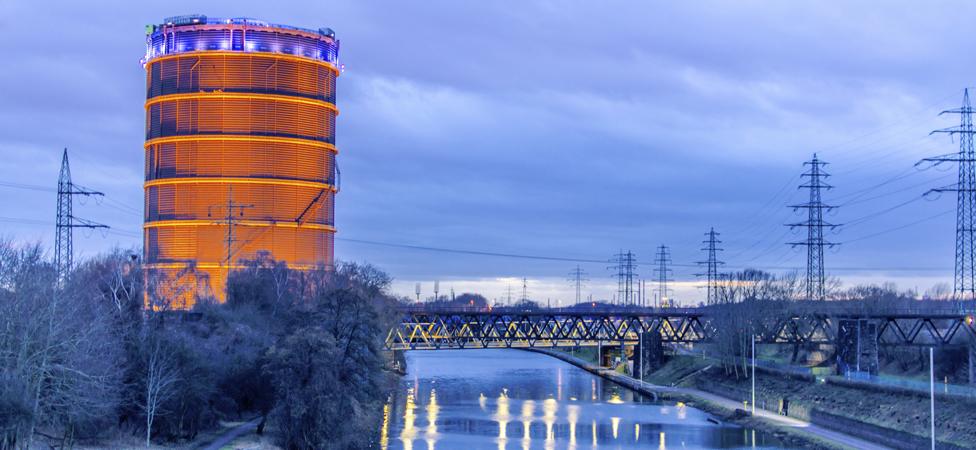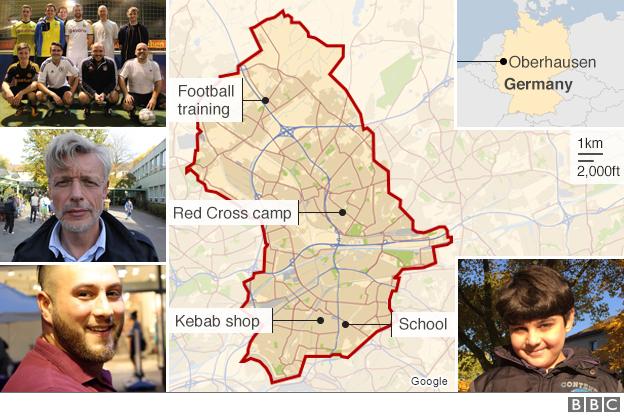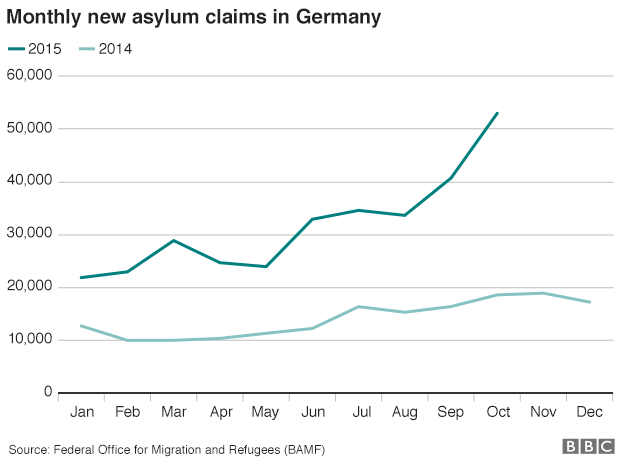Migrant crisis: How one city in Germany is coping
- Published

Oberhausen in the Ruhr valley has had to adapt from its industrial past
For many of the three-quarters of a million migrants who have reached Europe's shores so far in 2015, Germany has been the intended destination.
It expects at least 800,000 asylum applications by the end of this year alone and there are predictions of well over one million.
Thousands of people have travelled up from Turkey, through the Balkans and across Austria before claiming asylum on German soil.
More are coming every day and are distributed around the country to spread the pressure on civic resources.
To assess impact of the new arrivals, BBC News is following the progress of one city - and the people who live there.
Oberhausen in the populous North Rhine-Westphalia region is one of the many villages, towns and cities to receive an influx of refugees.

North Rhine Westphalia has taken the most asylum seekers of any German region in 2015
Situated near Duesseldorf in the Ruhr valley, Oberhausen was once an industrial powerhouse, producing coal, steel and zinc.
But now the pit heads are silent, a giant gas holder has been turned into an art space and Germany's largest shopping mall occupies a former factory site.
Take a whistle-stop tour of Oberhausen
The newest inhabitants of this city of 210,300 are 2,514 asylum seekers, housed in camps run by the Red Cross while they wait for their claims to be processed.
They have been largely welcomed into Oberhausen and the city has not seen any of the right-wing protests staged in Dresden and elsewhere, particularly in the east.
But the camps are full and, although more are being fitted out, hundreds of new arrivals are expected before the end of the year.
"People need patience," says Joerg Fischer of the German Red Cross.
Joerg Fischer of the Red Cross on life in the camps
Children from the camps have access to the local integration school, set up especially to teach young foreigners the German language and way of life.
The biggest group of asylum seekers have come from Syria but other arrivals are from Afghanistan, Albania and the Balkans.
Amer, 10, from Syria is settling into school life
Alya Aljazaeri, her husband and their baby son Rami have arrived in Oberhausen from Damascus in Syria, after a long journey via Turkey, Greece and the Balkans.
They are staying in one of the Red Cross camps where Alya, 18, says she is "so happy" to be in Germany.
Alya Aljazaeri fled Syria with her baby son

Germany has not seen such an influx of refugees since the Bosnian conflict of the early 1990s.
Between January and the end of October, 331,226 people formally applied for asylum in the country, 52,730 doing so in October alone.
But numbers arriving are much higher - 181,000 asylum seekers registered in October and more than 750,000 have done so this year so far.

As planned, North Rhine-Westphalia has taken more asylum seekers than any other German region in 2015, with 52,261 new claims between January and October.
Oberhausen has an established foreign-born population of 25,000, mainly from Turkey but also Italy, Serbia, Poland and other nations.
Cihan Ozturk runs one of his family's two kebab shops in the centre of the city. His parents are Turkish but he grew up in Germany.
"Here in Oberhausen it is easy, there are lots of foreigners... all nationalities mixed together, it's a good thing," he said.
Kebab shop owner Cihan Ozturk
However with an unemployment rate of 12.9% - more than double the German average - residents do worry that with each further arrival, civic resources are stretched a little more.
"There is a lot of fear among people who are already disadvantaged," says charity worker Michaela Wagner.
"They worry, 'Will we understand their culture and will they understand our customs?'"
But across town at a five-aside football game, players are more sanguine. "There is a welcoming culture which we lacked in the '90s when we last had significant immigration, it's improved a lot" says Jens Cartensen.
His son Jan, 29, agrees: "It's a very nice city, you feel the hard work of many people... people have solidarity."
Jan Cartensen explains what it's like to live in Oberhausen